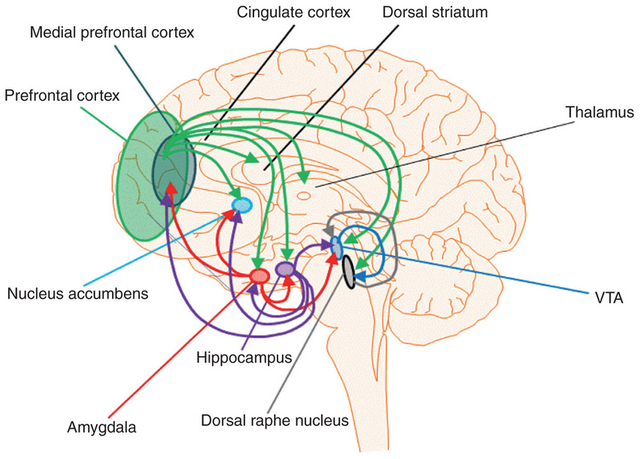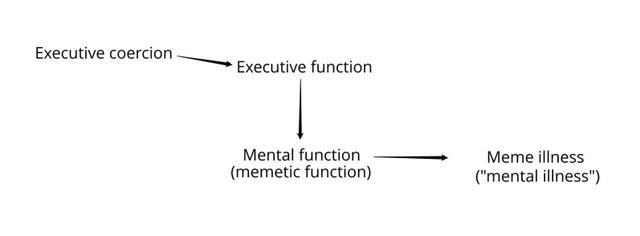Mysteriously, what is said to be the center of human will, executive function, the frontal lobe, is also magically impaired when people go into “social defeat response” or suffer from “executive disorder”. But none of this is a mystery, because “executive disorder” that culminates in “social defeat response” is a result of executive coercion, coercive government. In other words, your will is disturbed when someone else uses coercion to overrule your will. Psychiatry is spontaneous generation theory, it is the ethical foundation of statism. It is not a science, it is a false theory paradigm characterised by superstition. Be better. First, do no harm.

Executive function is responsible for the ability for "meme manipulation", or, mental function. Etymologically, "mental" comes form "of the mind", and at the lowest level, the mind is made up of memes. Executive function is not itself a mental process or equivalent with mental function, but does involve mental processes.
Psychiatry as a pseudo-science, in its pathetic and incompetent attempts at reasoning around mental health, assumes that executive disorder is a symptom of mental disorder. This is nonsensical, it is the other way around. Psychiatry as a lie puts the cart before the horse. Executive function is disturbed (in the case of "psychiatric disorders") by executive coercion, coercive government. Slavery. This disturbs the brains ability to select, filter and organize memes, it disturbs mental function, and makes the brain susceptible to "meme illness".

Psychiatry is "generatio spontanea", the ethical foundation of statism, and eugenics for belief, memes. It is the world view of executively disturbed slaves, or an authoritarian technique employed by their masters. Be better.
References
Pribram, K. H. (1973). The primate frontal cortex: Executive of the brain. In K. H. Pribram & A. R. Luria, Psychophysiology of the frontal lobes. Oxford, England: Academic Press.
Leigh, H., & Leigh, H. (2010). Genes, Memes, Culture, and Mental Illness. Springer NewYork. https://doi.org/10.1007/978-1-4419-5671-2
Price, J. (1967). THE DOMINANCE HIERARCHY AND THE EVOLUTION OF MENTAL ILLNESS. The Lancet, 290(7509), 243–246. https://doi.org/10.1016/s0140-6736(67)92306-9
Tidey, J. W., & Miczek, K. A. (1996). Social defeat stress selectively alters mesocorticolimbic dopamine release: an in vivo microdialysis study. Brain research, 721(1-2), 140–149. https://doi.org/10.1016/0006-8993(96)00159-x
Selten, J.-P., & Cantor-Graae, E. (2005). Social defeat: Risk factor for schizophrenia? British Journal of Psychiatry, 187(2), 101–102. https://doi.org/10.1192/bjp.187.2.101
Selten, J. P., van der Ven, E., Rutten, B. P., & Cantor-Graae, E. (2013). The social defeat hypothesis of schizophrenia: an update. Schizophrenia bulletin, 39(6), 1180–1186. https://doi.org/10.1093/schbul/sbt134
Selten, J. P., van Os, J., & Cantor-Graae, E. (2016). The social defeat hypothesis of schizophrenia: issues of measurement and reverse causality. World psychiatry : official journal of the World Psychiatric Association (WPA), 15(3), 294–295. https://doi.org/10.1002/wps.20369
Schalbroeck, R. (2020). The social defeat hypothesis of schizophrenia: A parsimonious explanation for multiple psychosis risk factors? Psychological Medicine, 1-2. doi:10.1017/S0033291720004092
Whitley, R. (2008). Is psychiatry a religion? Journal of the Royal Society of Medicine, 101(12), 579–582. https://doi.org/10.1258/jrsm.2008.080044
Moncrieff, J. (2010). Psychiatric diagnosis as a political device. Social Theory & Health, 8(4), 370–382. https://doi.org/10.1057/sth.2009.11
Nygren, Johan. (2019). Psychiatry Diagnoses Coercion in Government, Towards a Unified Theory of Psychiatric Disorders. http://doi.org/10.5281/zenodo.3369736